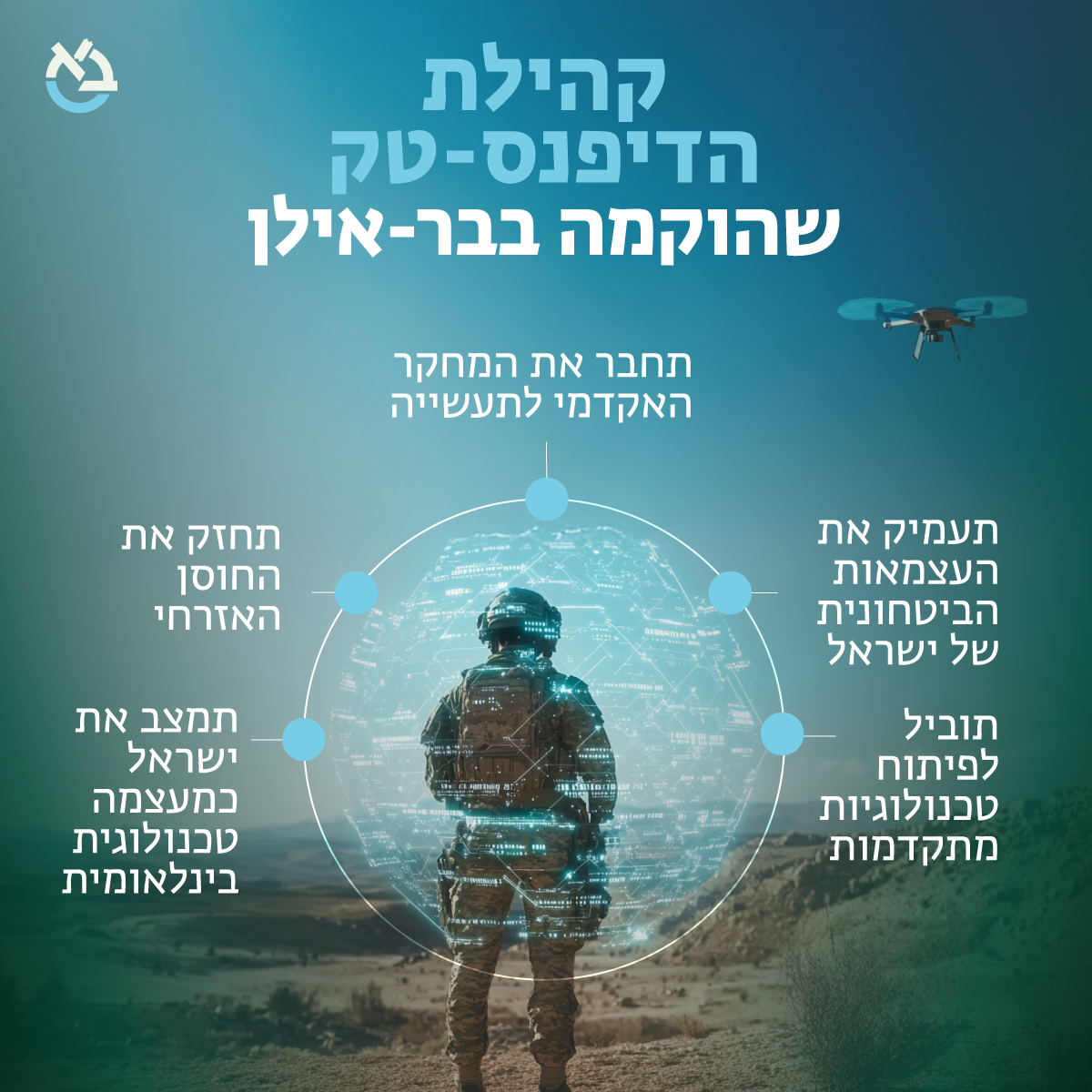דיפנס-טק: החזית השקטה של הביטחון הישראלי
אוניברסיטת בר-אילן שמתקיימים בה עשרות פיתוחים ופרויקטים הקשורים בתחום הביטחון הקימה קהילה רב-תחומית של חוקרים במטרה לחזק את הקשר בין האקדמיה לעשייה הביטחונית בישראל

הרחפן שמסייר מעל שדה הקרב ומשדר מידע חי, האלגוריתם שמזהה דפוס חריג במידע מודיעיני או הגלאי שמצליח לאתר נוכחות אנושית מאחורי קיר. כל אלה הן דוגמאות מוחשיות לעבודה של תעשיית הדיפנס-טק (Defense-Tech) הישראלית, תחום חדשני ודינמי שמציב את הטכנולוגיה בחזית הביטחון ומשלב בין צבא, תעשייה ואקדמיה באופן כמעט ייחודי בקנה מידה עולמי.
סקרנים? חושבים שאתם מכירים את ההמצאות הביטחוניות של ישראל? הנה חידון בנושא:
קהילת הדיפנס-טק בבר-אילן - תחזק את הקשר בין המחקר לתעשייה
ישראל נחשבת מעצמה בתחום טכנולוגיות הביטחון, אבל שימור היתרון הזה תלוי לא רק בגורמי הביטחון, אלא גם במחקר ובפיתוח השיטות והכלים שישפיעו על המלחמות הבאות. אוניברסיטת בר-אילן שמתקיימים בה עשרות פיתוחים ופרויקטים הקשורים בתעשייה זו, הקימה קהילה רב-תחומית של חוקרים במטרה לחזק את הקשר בין האקדמיה לעשייה הביטחונית בישראל. הקהילה כוללת כ-100 חוקרים מדיסציפלינות שונות כגון בינה מלאכותית, סייבר, הנדסה, קוונטום, חוסן לאומי וביוטכנולוגיה.

בכנס השקת קהילת הדיפנס-טק שנערך בבר-אילן ביוני 25, השתתפו לצד החוקרים גם בכירי התעשייה הביטחונית בישראל ביניהם: אלוף (מיל') עמיקם נורקין, שותף ומייסד של חברת ACE Capital Partners , שר המדע לשעבר והיזם יזהר שי מקים חברת Next October, ד"ר עוזי רובין ממרכז בגין-סאדאת למחקרים אסטרטגיים -בבר-אילן, סימה שיין בכירה לשעבר במוסד וחוקרת בכירה ב-inss, ישראל לופה, סמנכ"ל בתעשייה האווירית וד"ר נדב כהן ממפא"ת.
נורקין, לשעבר מפקד חיל האוויר, דיבר בכנס על האתגרים העומדים בפני כוחות האוויר כיום: "כניסה של טכנולוגיות חדשות משנה את שדה הקרב. לוקח זמן להבין את המערכות והאיומים החדשים, ובמקביל , עלינו לפתח את היכולת להתמודד איתם במהירות. בנוסף, האיומים היום מבוזרים יותר. ראינו זאת לאחרונה באוקראינה. כל מפקד חיל אוויר שצפה בתיעוד שואל את עצמו, איך מגנים על הבסיסים שלנו". בהתייחסות לעתיד, הוא הוסיף כי "לייזר, חלל ובינה מלאכותית, אלו שלושת התחומים שיכולים להוות את קטרי הצמיחה הבאים של המדע הישראלי."
חדשנות שנולדה מתוך מצור
הצמיחה של תעשיית הביטחון הישראלית לא הייתה מובן מאליה. מראשית דרכה, ישראל נאלצה לפתח עצמאות טכנולוגית בעקבות מגבלות בינלאומיות. כך נולדו מוסדות מחקר ומפעלים צבאיים ששיתוף הפעולה ביניהם הוביל להנחת היסודות לתעשייה משגשגת. כיום, ישראל נחשבת למובילה עולמית בתחום, עם ייצוא שיא של למעלה מ-14.7 מיליארד דולר ב-2024, מעל מאה אלף עובדים ומאות פיתוחים המשמשים צבאות בכל העולם.
הרחבת גבולות הדיפנס-טק
אוניברסיטת בר-אילן אינה גוף ביטחוני, אך היא הופכת במהירות למוקד מחקר מוביל, עם רשת גדלה והולכת של חוקרים העוסקים במגוון ההשלכות של מדע וטכנולוגיה בכל הקשור לעשייה הביטחונית, הרבה מעבר לתחומים הצבאיים המסורתיים. עבודתם משתרעת על פני הנדסה, רפואה, פסיכולוגיה, משפטים וחינוך.
בין היתר עוסקים חוקרי בר-אילן ב:
- פיתוח חיישנים עצמאיים המבטלים תלות ברכיבים מיובאים
- אלגוריתמים לגילוי אותות מבוססי AI הפועלים באמצעות עיבוד שפה טבעית ומודלי שפה גדולים - טכנולוגיות שבעבר היו שמורות למגזר הפרטי, וכיום מנוצלות לאיסוף מודיעין
- פתרונות אנרגיה צבאיים חכמים, כגון מערכות טעינה מותאמות לשטח וקציר אנרגיה מתחדשת בתנאים עוינים
- ננו-חומרים מתקדמים החוסמים זיהוי תרמי או מסווים כוח אדם וציוד ממערכות מעקב מתקדמות
- נחילי רובוטים חכמים המשמשים לפטרולים בשטח בעלי תנאי עבירות קשים
היקף החדשנות נמתח הרבה מעבר לחומרה: חוקרים ברפואה ובפסיכולוגיה מתמודדים עם טראומה פוסט-קרבית בקרב חיילים ואזרחים. מומחי חינוך מעצבים מערכות למידה מרחוק לילדים שפונו מאזורי סכסוך. חוקרי משפט מנתחים את המסגרות האתיות והמשפטיות סביב מערכות אוטונומיות בלחימה, ועוד.
האקדמיה היא המקום לדמיין פתרונות חדשים
את תחום הדיפנס-טק בבר-אילן מוביל פרופ' זאב זלבסקי, סגן נשיא האוניברסיטה לקשרי תעשייה. פרופ' זלבסקי, חוקר בתחום הדיפנס-טק בעצמו, השתתף בפיתוח מערכת מבוססת לייזר המסוגלת לזהות סימני חיים - כגון נשימה ודופק - דרך קירות ומרחק. "תעשיית הדיפנס-טק הישראלית מצטיינת בהתאמה מהירה של טכנולוגיות קיימות", אומר פרופ' זלבסקי. "אבל אם אנחנו רוצים להוביל בעשור הבא, עלינו להשקיע במחקר יסוד. האקדמיה היא המקום לשאול את השאלות שאף אחד לא שואל בשטח - ולדמיין פתרונות שאף אחד עוד לא חשב עליהם."
הדרך קדימה: חיזוק הקשר בין מדע לביטחון
פרופ' זלבסקי פועל להעמקת הקשרים בין חוקרי בר-אילן לתעשיית הדיפנס-טק הרחבה. חזונו כולל:
- יצירת שיתופי פעולה בין גורמי ביטחון למומחים אקדמיים
- הקמת קונסורציום מחקר המתמקד בפרויקטים בעלי השפעה גבוהה
- הבטחת מימון לתרגום תובנות תיאורטיות ליישומים מעשיים
לדבריו, "בשנים האחרונות, תחום הדיפנס-טק הוא אחד הסקטורים היחידים שבהם המעמד העולמי של ישראל לא נפגע - אלא רק התחזק. זה הזמן לנצל את המומנטום ולחזק הקשרים בין האקדמיה, התעשייה והביטחון הלאומי."